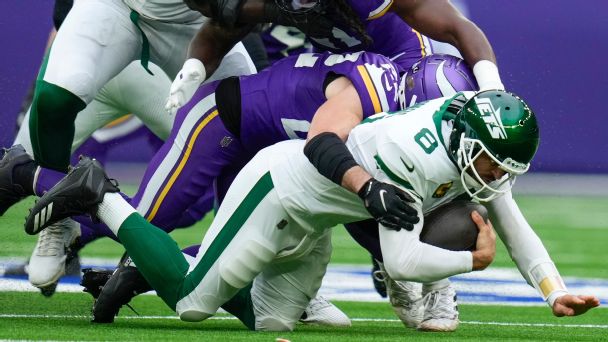
Aaron Rodgers' Influence on the Jets: A Closer Look at the Fallout
In recent weeks, the New York Jets have been the center of attention in the NFL, not just for their performance but for a significant shake-up within the team. Following their disappointing 2-3 start, head coach Robert Saleh became the first coach to lose his job this season. This decision raised eyebrows, especially given that the Jets had a fighting chance to turn their season around. As they prepared to face the Buffalo Bills, one of their divisional rivals, many wondered if firing Saleh was truly the right move.
It’s essential to highlight that Saleh was not the main problem for the Jets. When a team acquires a four-time MVP quarterback like Aaron Rodgers, expectations skyrocket. With Rodgers comes an entire ecosystem—he is not merely a player but also operates almost as a de facto offensive coordinator. This unique dynamic can lead to friction between the head coach and the quarterback. There were signs of discord between Saleh and Rodgers; for instance, during a game against the New England Patriots, Saleh attempted to celebrate a lead with Rodgers, who notably brushed him off. Their public disagreements, particularly about cadence issues, signaled deeper underlying problems.
Also Read:- Germany vs Netherlands – A UEFA Nations League Showdown with Intensity
- Wales Edges Montenegro 1-0 in Uefa Nations League Thriller
Looking at Rodgers' recent performances, it becomes evident that the 40-year-old quarterback is not playing at the level expected of him. His struggles were highlighted in a game against the Minnesota Vikings, where he threw three interceptions and displayed poor body language after underthrowing an open receiver. The Jets' offensive struggles cannot be pinned solely on Saleh’s departure. Instead, it's crucial to recognize that the offense has been lagging significantly behind the team's strong defensive performances.
In the wake of Saleh's firing, the Jets have turned to defensive coordinator Jeff Ulbrich as the interim head coach. Ulbrich has already made some notable changes, including demoting offensive coordinator Nathaniel Hackett. This swift action suggests that Saleh may have wanted to make similar adjustments before his departure. The key challenge now lies in whether the new leadership can extract the best from Rodgers, who has brought in players from his past teams but still struggles to find his rhythm with them.
One potential avenue for revitalizing the offense could be acquiring wide receiver Davante Adams from the Raiders, a move that seems logical given his successful history with Rodgers. However, the Jets' offensive problems go beyond personnel. They have struggled with consistent blocking and run game execution, and their current strategy does not align well with the skill set of their players. Rodgers, who previously thrived in a structured environment with the Green Bay Packers, now seems to be struggling without a similar framework in place.
The reality is that the Jets are in a precarious position. They must navigate these internal conflicts while striving for a winning season. If they do manage to turn things around, it could lead to narratives suggesting that Saleh was the issue all along, which would be misleading. Under his leadership, the Jets' defense has been one of the top units in the league. However, if the offense continues to falter, it may indeed be Rodgers’ responsibility to take accountability for the team’s performance moving forward.
As the Jets adapt to their new leadership and re-evaluate their offensive strategy, the spotlight remains firmly on Aaron Rodgers. The upcoming games will be crucial in determining if he can elevate the team and fulfill the high expectations that come with being a premier quarterback. Ultimately, the real question is whether Rodgers can overcome the challenges he faces and lead the Jets to success in a season that has already seen its fair share of turmoil.
Read More:

0 Comments